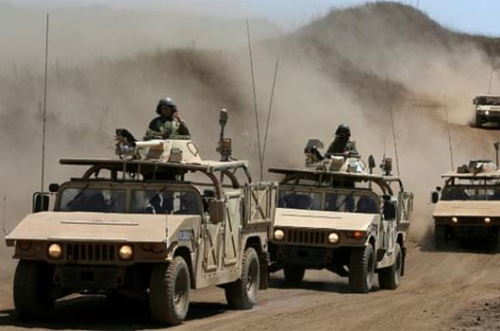Israeli air strikes hit Iranian targets in Syria killing ten
AFP | Jerusalem
The Daily Tribune – www.newsofbahrain.com
Israeli warplanes struck Iranian targets in Syria on Wednesday, killing 10 Syrian and foreign fighters in what the Israeli army described as a 'retaliatory attack' after explosive devices were found near one of its bases in the occupied Golan Heights.
Israel and Syria, still technically at war, have a border along the Golan Heights, which the Jewish State has occupied since the Six-Day War of 1967.
The air strikes came just hours before US Secretary of State Mike Pompeo was due to land in Israel for talks in what is due likely to be his last visit to the staunch American ally before President Donald Trump leaves office.
An Israeli army statement said its fighter jets had hit 'military targets belonging to the Iranian Quds Force and the Syrian armed forces' overnight.
The elite Quds Force is the main foreign operations arm of Iran's Revolutionary Guards.
The targets included 'storage facilities, headquarters and military compounds' as well as 'Syrian surface-to-air missile batteries,' the statement said.
Syrian state news agency SANA said the strikes had killed three of its soldiers and wounded another.
The monitoring group Syrian Observatory for Human Rights said 10 people were killed, including foreign fighters as well as Syrian soldiers.
The foreigners included five fighters who were 'likely Iranian and belonging to the Quds force' as well as two pro-Iran fighters of undetermined nationality, the UK-based monitor said.
Israel has carried out hundreds of air and missile strikes on Syria since civil war broke out there in 2011, targeting Iranian and Lebanese Hezbollah forces as well as government troops.
Israel rarely acknowledges individual strikes, but has done so when responding to what it describes as 'aggression inside Israeli territory.'
The country's military said it had discovered improvised explosive devices (IEDs) on its side of the armistice line on the Golan Heights on Tuesday.
'We are talking about three connected Claymore anti-personnel charges that were planted close to an IDF position,' army spokesman Jonathan Conricus told reporters on Wednesday.
'This was another attempt led by Iranian Quds forces. The actual planting of the IEDs was by Syrian locals but the guidance, instruction and control was by Iranian Quds forces,' he said.
Most Arab residents of the Israeli-occupied Golan Heights retain Syrian citizenship, having spurned the offer of Israeli papers.
Conricus said Israel had carried out retaliatory strikes against eight separate targets inside Syria, from the armistice line on the Golan all the way to the southern outskirts of the capital Damascus.
He said they included three Iranian command centres - a headquarters in the Damascus airport, a Quds Force base in the headquarters of Syria's seventh army division and a 'secret military site which served as a hosting facility for senior Iranian delegations'.
'We hope now that the message is clear - that it is unacceptable that the Syrian regime allows and tolerates and facilitates the use by Iranian forces of Syria as a launchpad for attacks against Israel.'
Iran has been a key ally of Syrian President Bashar al-Assad's regime throughout the civil war that erupted after the brutal repression of anti-government protests in 2011.
The ongoing conflict has killed more than 380,000 people. More than 5million Syrians have fled the country, while more still have been internally displaced - 6.6million according to the UN refugee agency (UNHCR).
Wednesday's air strikes came hours before Pompeo was due to land in Israel, for talks on Iran that are expected to focus on Israeli fears of a softer policy towards Iran after the Trump administration hands over to Democrat Joe Biden in January.
Biden has made clear that he intends to rejoin the Iran Nuclear Deal, which was agreed while he served as vice president under Barack Obama.
Trump withdrew the US from the deal in 2018, prompting further souring of US-Iranian relations which have been dire since the Iranian Revolution of 1979 but experienced a relative detente under Obama.
Israel Prime Minister Benjamin Netanyahu, who called Trump his country's strongest-ever ally in the White House, has heaped praised on the administration for its hardline approach towards Iran.
Analysts suggest he is likely to be concerned about the incoming Biden administration, which is also unlikely to support further land grabs as Trump had done.
Along with backing out of the nuclear deal, Trump's so-called 'maximum pressure' campaign against the Islamic Republic has included crippling sanctions on Iran.
Bahraini Foreign Minister Abdellatif al-Zayani was also due in Israel for the first visit on Wednesday.
It will be the first by a senior official official of the Gulf Arab state since it signed a normalisation deal with Israel on September 15.
The deal was condemned as a betrayal by Iran and its regional allies. Many Arab states officially refuse to engage with Israel until a two-state solution is reached with Palestine.
However, the United Arab Emirates and Sudan have also normalised relations with Israel this year.
Related Posts

